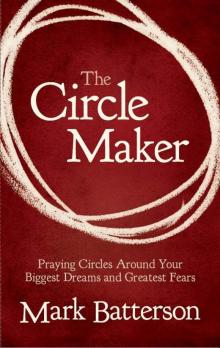- Home
- Mark Batterson
Whisper Page 15
Whisper Read online
Page 15
One Word
Pete Bullette leads Chi Alpha at the University of Virginia, a thriving campus ministry that is influencing hundreds of students. Seventeen years ago Pete did an internship with Chi Alpha in DC and attended National Community Church. One day I sat in on their sermon lab and heard Pete preach. The basement setting wasn’t ideal, and neither is preaching to seven people. But God gave me a prophetic word for Pete. I pulled Pete aside afterward and said, “Someday God is going to let you speak to thousands.”
Pete found it a little unbelievable at the time, and you better be extracareful before speaking words like that. The last thing you want to do is set people up for disappointment. Actually, that’s the next-to-last thing you want to do. The last thing is not obeying the prompting of the Holy Spirit.
“What you spoke into my life seventeen years ago is now coming to fruition,” wrote Pete recently. He speaks to hundreds of students week in and week out, but he had just been invited to speak to a gathering of thousands in Houston, Texas. It was that invitation that prompted his e-mail message. “I don’t write this to pat myself on the back,” he said. “I write it to close the loop on the prophetic word that has encouraged me for almost two decades.”
I’ll be the first to confess that I probably miss more opportunities than I seize, but I am always amazed at the power of one prophetic word. And I’ve been on the receiving end. At a very fragile age and stage in my life, a missionary prayed over me. I’m sure he wouldn’t even remember it, but his prayer turned prophetic midstream when he said, “God is going to use you in a great way.” I know that sounds awfully generic, but that one sentence has carried me through some tough times.
I’m eternally grateful for the people who pointed out things in me that I didn’t see in myself. No one was better at doing that for people than Jesus, and we’re called to follow suit. Again, let’s do it in a spirit of humility. And let’s exercise emotional intelligence while we’re at it. But make no mistake, God wants to speak through you. And it often starts with simply noticing who’s next to you.
A Vision for People
I love the story Pastor Erwin McManus shared in a TED Talk about his first TED conference in Tanzania.35 Erwin is an extreme introvert, so his daughter gave him a few sociability tips: don’t hide in a corner, and try not to look too scary. Erwin took her advice and tried to identify the kindest-looking person to have lunch with. He ended up having a very lengthy and interesting conversation with a woman named Jane, but there was something quirky about the conversation. Erwin says, “Have you ever met people who are so passionate about something that no matter what you talk about, they’re going to talk about whatever they want to talk about?”
No matter what subject they discussed—from human relationships to geopolitical systems in China—Jane always related it back to chimpanzees. After an hour of this, something dawned on Erwin. He said, “Jane, can I ask you a question? Is your last name Goodall?” Sure enough, Erwin was having lunch with the foremost primatologist in the world, Jane Goodall. And he had no idea for the first hour!
May I make a very blunt observation? Loving your neighbor starts with an awareness of his or her existence. No one is in your life by accident; everyone is there by divine appointment. It’s your job not just to notice them but to care for them. And that goes for introverts, extroverts, and everyone in between. The most caring thing you can do is talk to God about them and listen to Him regarding them.
If God gives you a word of encouragement for someone, speak it. You don’t have to pronounce, “Thus sayeth the Lord.” That might spook them. You might even want to couch it the way Dick Foth does and give them a scale from one to ten. However you approach it, it’s your responsibility to love the people God has put in your life, and that means “speaking the truth in love.”36 When you do, one word can make all the difference in the world.
When we hear the word vision, we tend to think of some grand objective, such as putting a man on the moon. And that is one type of vision. But the most important kind of vision is a vision for people. And again, Jesus sets the bar.
We don’t know much about Mary Magdalene, but we do know that she was possessed by seven demons before Jesus cast them out.37 Mary had seven problems she couldn’t solve. Mary was broken in seven places. Those are the people we tend to give up on, but not God. He won’t give up, can’t give up! It’s not in His nature.
We write off people like Mary, but Jesus writes them in. In fact, Mary became the leading lady in the most important episode in all of Scripture. She was the very first person to witness the resurrection of Jesus Christ and will be forever known as “the apostle to the apostles.”38 Put that on your business card! And that’s just like God, isn’t it?
We write people off.
Jesus writes people in.
The Ring Master
A few years ago my friend Carlos Whittaker wrote a wonderful book titled Moment Maker. I had written The Circle Maker a few years before that, so right after his book released, I gave him a fist bump and the customary Super Friends greeting: “Wonder Twins powers activate. Form of the circle maker.” He took the cue and said, “Form of the moment maker.” Just giving you a glimpse into my second quadrant.
At the beginning of his book, Carlos tells a story about a defining moment in his life. It happened in a preschool classroom in the basement of a church building in Decatur, Georgia. “I was a shy kid,” said Carlos, “a Panamanian/Mexican with an Afro parted down the side like Gary Coleman on his best day in a land of bright blond hair, deep blue eyes, and thick southern accents.”39 Carlos was an outlier, and he knew it.
The defining moment happened on the day that parts were handed out for the thirteenth annual Rehoboth Presbyterian Church Preschool Circus. The year before, Carlos had been a lion. His roar had come out more like a meow, and the crowd erupted in laughter. Carlos was scarred with shame, and here he was again at the scene of the crime.
His teacher, Mrs. Stephens, started assigning parts. Mary—dancing bear. Brandon—clown. Jay—muscleman. Whittaker is at the end of the alphabet, and when Mrs. Stephens got there, she took off her glasses, smiled a smile that Carlos remembers to this day, and said, “Carlos…you are going to be this year’s Ring Master.”40
“That moment, wrapped up in that one sentence, actually changed everything for me. It changed the trajectory of my very future,” said Carlos as though it happened yesterday. “She thought I could be the Ring Master.”41
In the eighth grade Carlos would have been content to have been the class treasurer, but he ran for president. Why? Because he was the Ring Master. Carlos has led worship at stadiums filled with tens of thousands of people, and he’s been the master of ceremonies at more than a few conferences I’ve spoken at. Carlos is the master—master of ceremonies! But it traces back to something that a preschool teacher saw in him. She didn’t just assign a role in the thirteenth annual Rehoboth Presbyterian Church Preschool Circus; she gave Carlos a new self-image.
What I’m about to say might not sound very exegetical, but I think that is precisely what Paul did for Timothy. Neither Timothy nor Carlos knew where he belonged.42 I wonder if Timothy would have crawled into his shell and never come out if Paul hadn’t spoken that word of exhortation. Timothy would eventually become the Ring Master at the church of Ephesus, but it started with one prophetic word.
Good Grammar
Every language has rules. For example, “I before e except after c.” That’s especially true of the fifth language. Because it involves at least two personalities, it’s twice as complicated as the other languages, and it’s more open to misinterpretation.
So here are a few ground rules.
First, no one is above rebuke. The minute you think you’re beyond temptation, you’ve fallen into it. Your assignment at the end of this chapter is easy, and it isn’t. Give someone permission to speak into your life. Make sure it’s someone you trus
t. And when the person says something you don’t want to hear, listen very carefully.
Second, don’t let an arrow of criticism pierce your heart unless it first passes through the filter of Scripture.43 And the same goes for compliments. If you live off compliments, you’ll probably die by criticisms. Again, we must interpret the language of people through the language of Scripture. If something doesn’t add up, throw it out. If it does, repent.
Third, don’t make decisions in a vacuum. I’m an intrapersonal processor, so I generally process things internally. But as I’ve already stated, the Bible exhorts us to seek wise counsel. Again, no one shoots the moon by himself. Show me the people you surround yourself with, and I’ll show you your future.
Fourth, listen long and hard before you dish out advice. The primary reason we don’t hear what others have to say is that we’re formulating our answers while they’re talking. We listen in order to talk instead of listening to listen. One way to make sure we’ve heard what they said is to practice a counseling technique called restatement. We repeat back what we heard to make sure we got it right.
Fifth, always encourage before you correct. That’s the pattern in the book of Revelation. God hands down some tough judgments on the seven churches in Revelation but not before He speaks a word of encouragement. Nothing is as disarming as a compliment as long as it’s genuine. According to the Losada ratio, we need at least 2.9 instances of positive feedback for every negative feedback.44 And if you’re going to err on one side or the other, err on the side of positivity.
Sixth, tough conversations get tougher the longer you wait. I tend to avoid conflict, but I’ve come to realize that I’m not doing anybody any favors when I do so. Conflict isn’t fun, but it helps us grow. Iron doesn’t sharpen iron without some sparks flying! Sometimes you have to have what seem to be hurtful conversations with people in order to be helpful, but make sure your motives are right. If you’re saying something just to get it off your chest, don’t bother. It’ll backfire. Genuine relationships are full of grace and truth.
Without grace, relationships have no heart. Without truth, relationships have no head. But when they are full of grace and truth, our relationships ring true. Then and only then will we hear the voice of God through others.
THE ARCHER’S PARADOX
The Sixth Language: Promptings
For such a time as this.
—ESTHER 4:14
Teddy Roosevelt was president of the United States. Henry Ford produced his first Model T.1 Movies were silent. Women couldn’t vote. And a loaf of bread cost five cents, but sliced bread wouldn’t be invented for two more decades. Oh, and the Chicago Cubs won the World Series!
The year was 1908.
We would fight two world wars, land a man on the moon, and invent the Internet before the Cubs would win the World Series again in 2016. It had been 108 years, and a baseball is sewn together with 108 stitches. Coincidence? You tell me!
In the top of the tenth inning of game seven, after a gut-wrenching rain delay, Ben Zobrist hit a two-strike double down the third-base line off pitcher Bryan Shaw, driving in the go-ahead run. So many Chicagoans jumped up and down simultaneously that it actually registered on the Richter scale! I’m joking…I think. But it did result in the tenth-largest peaceful gathering in human history as reportedly five million Cub fans would “fly the W” a few days later.2
That’s where I interrupt this fairy-tale ending to the Cubs’ curse with a question. How did World Series MVP Ben Zobrist hit that pitch? For that matter how does any batter hit a 2.86-inch diameter baseball that travels 60 feet, 6 inches in 0.43-seconds?3 It takes one-fifth of a second for the retina to receive incoming messages, and by then the ball is already halfway to home plate.4 The margin of error between a swing and a hit and a swing and a miss is just 10 milliseconds! That’s fifteen times faster than the blink of an eye.5
Back to the question. How do you hit a high-inside fastball going a hundred miles per hour or a wicked curveball that can break up to 17.5 inches?6 The twofold answer is good vision and good timing. Vision without timing takes a strike. Timing without vision swings and misses. It’s the unique combination of vision and timing that gets the hit.
We already touched on the importance of vision when we explored the language of dreams. Now it’s time to talk about divine timing. Remember the old adage “Timing is everything”? It’s as true in life as it is in baseball, and it’s especially true when it comes to learning the language of promptings. God is in the business of strategically positioning us in the right place at the right time, but we don’t always recognize it as such. He is always right on time, even if it’s just in time.
King Solomon said, “There is a time for everything.” Then he listed twenty-eight examples.7 Simply put, you need to know what season you’re in. If you don’t, you’ll get frustrated trying to harvest when it’s time to plant or trying to plant when it’s time to let the land lie fallow. And the stakes couldn’t be any higher. Bad timing can be as calamitous as good timing is fortuitous.
Discerning the voice of God requires an internal clock that perceives His promptings. And it’s our reaction time to those promptings that leads to supernatural synchronicities: being in the right place at the right time with the right people. That’s precisely what the prophet Isaiah promised:
Whether you turn to the right or to the left, your ears will hear a voice behind you, saying, “This is the way; walk in it.”8
Kairos Moments
There are two words for time in the New Testament. The first is chronos, and it refers to clock time or calendar time. It’s where we get our English word chronology. Chronos is sequential—past, present, future. And it is linear, moving in only one direction.
According to Greek mythology, Chronos was a short god with muscular legs and winged heels. He moved so fast that once he passed you, he was impossible to catch. To symbolize the transience of time, Chronos had a full head of hair in front but was bald in back. In other words, you can’t grasp the present once it’s past.9
Finally, and most significantly, chronos is a human construct. It’s how humans measure time, but God exists outside the space-time dimensions He created. So we have to be very careful not to put Him on our clock, in our box.
The second word for time is kairos, and it refers to the opportune time. Chronos is quantitative; it counts minutes. Kairos is qualitative; it captures moments. It’s the critical moment or the appointed time—“for such a time as this.”10 It’s carpe diem, “seize the day.”
Kairos is an archery term that denotes an arrow that is fired with sufficient force to penetrate the target.11 Better yet, it’s the archer’s paradox. Logic suggests that an arrow be aimed right at a target. But if it’s a long distance away, a seasoned archer knows that a vast array of variables will affect the flight path. The arrow must actually be aimed off target in order to hit the target. The ability to evaluate those variables is kairos.
Time management, as in chronos, is important. The psalmist tells us to “number our days.”12 And I believe in Vince Lombardi time: if you aren’t fifteen minutes early, you’re late! But the apostle Paul took the idea of time management one step further when he told us to redeem the time.13 It’s not the word chronos; it’s the word kairos. And it literally means “making the most of every opportunity.”14
If you miss the opportunity, it’s an opportunity cost. It might even be a sin of omission. If you make the most of an opportunity, it can turn into a defining moment.
I recently spoke at a congressional retreat during a very tense political season. In fact, I had to weave my way through a thousand protestors and a police barricade to get into the hotel where the event was held. My rule of thumb is, if I have an opportunity to preach the gospel, I’ll preach to either side of the aisle. That’s the example Paul set in his “all things to all people” ministry.15
The devotional I sh
ared was during the first session of the day, an optional session, so I was impressed that a few dozen members of both the House and Senate showed up. To be honest, I was a little nervous and had a difficult time figuring out what to say. But as is often the case, the highlight wasn’t anything I said. It was a prompting that went past protocol. I felt impressed to ask everyone to kneel for prayer. I wasn’t sure how these national leaders would respond to it, but I took the risk that I felt the Holy Spirit was asking me to take. And in a way I never could have predicted or planned, it turned into a holy moment, holy ground. The spiritual and emotional response was visceral. Is kneeling going to solve all our political problems or resolve all our political tensions? No, but it’s not a bad place to start.
Chronos time may be measured in minutes, but life is measured in kairos moments. Discerning those moments is part of hearing God’s voice. Hearing Him means discerning the holy moments when you need to drop to your knees. It’s discerning the critical moments when you need to make a difficult decision. As a parent, it’s discerning the teachable moments that can turn into defining moments for your kids.
I hate to admit it, but I miss more kairos moments than I seize. Sometimes I let fear dictate my decisions. I’m afraid of feeling awkward or looking foolish, so I fail to step out in faith. Sometimes I’m too preoccupied with my own problems to discern God’s promptings. But listening to those whispers and obeying them can turn an ordinary day into the adventure of a lifetime!
On a Dime
Life turns on a dime, and the dime is the decisions that change the trajectory of our lives forever. Some of them are well thought out, while others happen on a whim. Either way, it would be terrifying if it weren’t for God’s ordering our footsteps, wouldn’t it?

 Jack Staples and the Ring of Time
Jack Staples and the Ring of Time Jack Staples and the City of Shadows
Jack Staples and the City of Shadows Jack Staples and the Poet's Storm
Jack Staples and the Poet's Storm Whisper
Whisper The Circle Maker_Praying Circles Around Your Biggest Dreams and Greatest Fears
The Circle Maker_Praying Circles Around Your Biggest Dreams and Greatest Fears